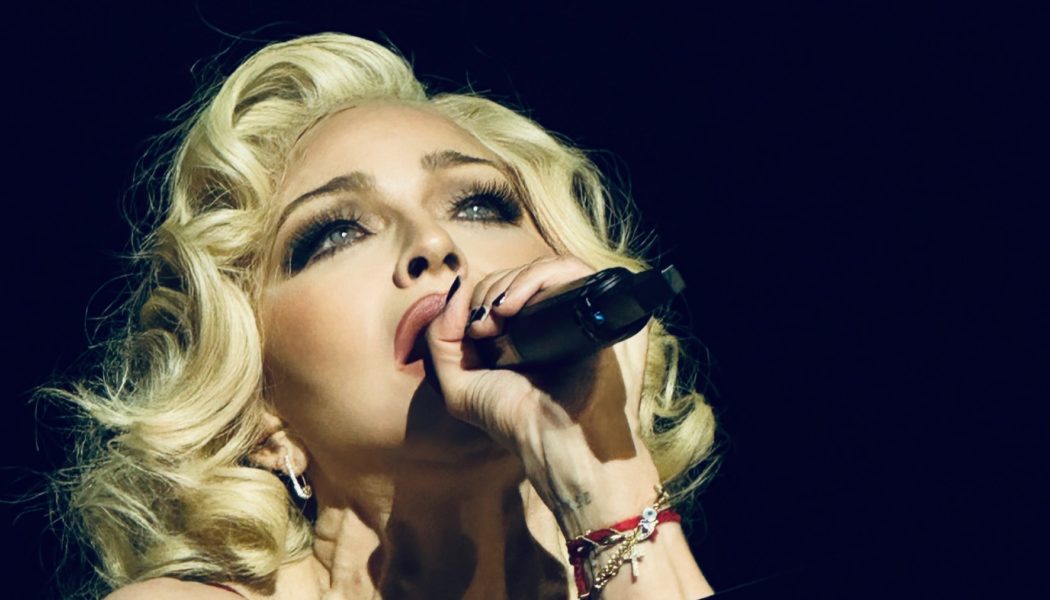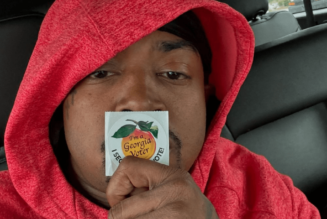
“The most controversial thing I’ve ever done is stick around,” Madonna announced at the conclusion of a career retrospective montage during her “Celebration Tour.” It was certainly a “mic drop” by itself, but in the context of the show, it really set in — through every era, every romance, every success, and every pearl-clutching controversy, Madonna has risen from the ashes and reinvented herself.
That statement is relevant to her whole career, but it also takes on a bit of added weight given the tour’s narrative: After a nasty bacterial infection put Madonna in the ICU for several days, she had to reschedule the first North American leg of her “Celebration Tour.” So, for the opening date of the series at Brooklyn’s Barclays Center on December 13th, Madonna carried an air of overwhelming gratitude, sounding elated to even be alive.
As such, Madonna provided a thrilling, throughly engaging night of pop music. As she had during the tour’s European leg earlier this year, “The Celebration Tour” features a setlist that spans four decades, with songs from each and every major Madonna studio album (with the exception of 2019’s Madame X, which has been omitted from the show entirely). While the set is something of a “Greatest Hits” tour — an “Eras Tour,” if you will — that’s not the guiding factor. Madonna opted to keep several of her biggest hits out of the setlist (“Material Girl,” “Like a Virgin,” “Borderline,” “Frozen”) in favor of tracks that aren’t always given their flowers — particularly songs from 2003’s American Life, Erotica‘s title track, and “Bad Girl,” which she’s playing now for the first time since her 1993 Saturday Night Live performance.
Related Video
Though the “Celebration” was already set to come before Madonna’s illness this year, the episode influenced the show’s sensitive, thankful aura. Even more emotional for Madonna was her homecoming — as Bob the Drag Queen playfully reminded us at the onset of the show, New York City is where it all began for Madonna, who arrived here in 1978 with only $35 in her pocket. Throughout the evening, Madonna acknowledged the role that New York played in both her career and her personality, frequently shouting out the unique “New Yorker” attitude that Madonna herself has cultivated and even busting out the Confessions on a Dance Floor cut “I Love New York” for the first time in 15 years.
@consequence @madonna kicked off the North American leg of “The Celebration Tour” in Brooklyn. 💃 #madonna #thecelebrationtour #livemusic
Unlike the New York decree that “To be on time is to be five minutes early,” however, Madonna didn’t take the stage until 11:00pm and didn’t finish the set until around 1:15am — according to Madonna, this is because “New York is not for little pussies who sleep.” The show went so late that the pair of middle-aged women next to me left the show with an hour still remaining, especially upon realizing that Madonna wouldn’t be playing “Like a Virgin.”
Still, “The Celebration Tour” is mainly an opportunity for Madonna to have a dialogue with Madonna. At different points in the show, she stood face to face with a past version of herself. She drank and rambled alongside her “shy” 1983 persona, setting the stage for an examination of Madonna’s various reinventions throughout the last 40 years. She playfully danced with a performer wearing her iconic cone bra, and leaned harder into the provocative BDSM imagery of her Erotica era. She also invited her children to perform onstage with her, merging the past, present, and future of her family. With the show’s several screens positioned around the arena stage, Madonna confronted the images of those she’s lost: her mother immortalized on “Mother and Father,” and her touching rendition of “Live to Tell” featured images of significant gay and trans figures that died of AIDS.









